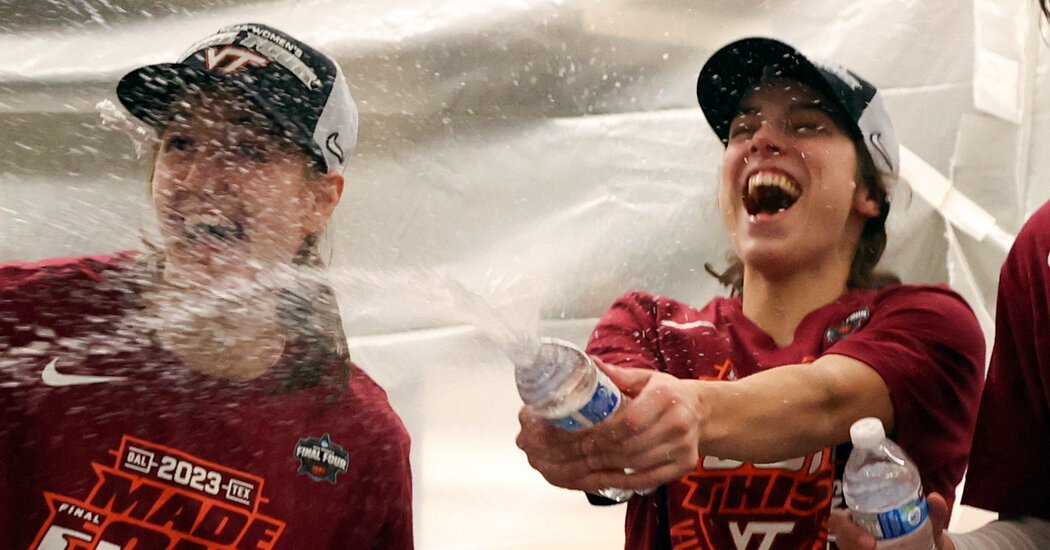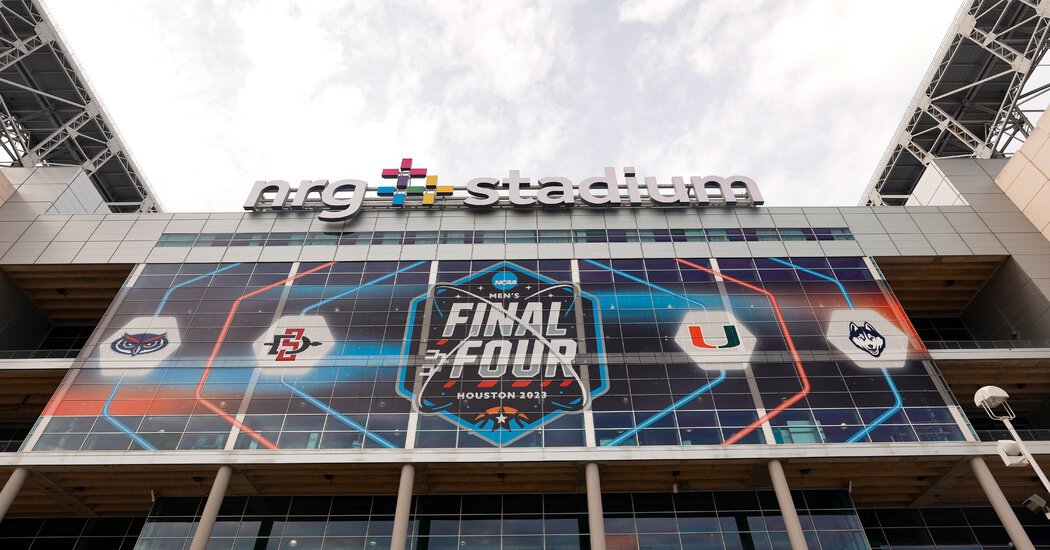
When Every Win Means Water, Water Everywhere
[ad_1]
By Andrew Keh March 31, 2023
Picture yourself at work. You’re chatting by the water cooler. A colleague swings by to say she got that big promotion she’d been after. You and your co-workers are so happy for her that you all take your cups of water and dump them on her head.
In most workplaces, this would rightfully be categorized as deranged behavior. Teleport this scene into a sports locker room, though, and suddenly the dousing is perfectly in bounds.
Dropped 50 points at Madison Square Garden? Enjoy a few gallons of water in your face. Just crushed a walk-off home run? Get your umbrella out. Reached a major statistical milestone? Welcome to Splash Mountain.
Athletes love pouring things on each others’ heads. Major League Baseball teams started spraying champagne to celebrate championships sometime around the 1960s. N.F.L. players have been unloading Gatorade coolers on unsuspecting coaches at the Super Bowl since the mid-80s.
But water in recent years has become the go-to beverage for athletes seeking a quick and relatively hygienic way to commemorate achievements large and small. And few segments of the sports calendar are as waterlogged as March Madness, when men’s and women’s college basketball teams navigate six rounds of anxiety-ridden, must-win contests in constant search of catharsis.
“In the moment you’re all excited but don’t really know what to do, so it’s like, let’s just throw water around,” said Jack Nunge, a center for Xavier, whose locker room briefly resembled the inside of a carwash after the team’s second-round win over Pittsburgh. “We’re not trying to ruin anyone’s clothing or anything.”
Brock Cunningham, a Texas forward, on two separate occasions emptied a 10-gallon cooler on Coach Rodney Terry and his teammates during the Longhorns’ soggy run to the regional finals.
“We celebrated in the puddle,” Cunningham said.
Moments after securing a spot in the round of 16, the Villanova women’s players, armed with squeeze bottles, arranged themselves into an impromptu firing line and shot streams of cold water on Coach Denise Dillon as she dashed into the locker room.
“I’ll take the shower anytime,” said Dillon, who sat for a postgame news conference with her hair still soaked.
Splashing a bit of water around in a moment of ecstasy is not entirely new, but postgame celebrations of this sort have become more prominent and essentially routine over the past decade. Teams now regularly post videos of them to social media as part of their marketing efforts.
Grant Hill, a former college and N.B.A. star, said he believed the omnipresence of cellphone and television cameras — and the increasing willingness of players to accept them into locker rooms — had increased these celebrations in recent years.
Hill, 50, an analyst for the tournament, visibly shuddered when asked if he and his Duke teammates in the early 1990s had ever doused Mike Krzyzewski, the team’s famously stoic coach, in similar fashion.
“We never poured water — especially on Coach K — I mean, that wasn’t even thought of,” said Hill, who sensed that the bar for this kind of revelry seemed to be lowering. “Nowadays they celebrate everything.”
And athletes, therefore, are acting more amphibious.
The Sacramento Kings last month danced inside a man-made tsunami after a double-overtime victory over the Los Angeles Clippers. The golfer Lydia Ko was soaked by her fellow competitors after her first ever professional win — and, in keeping with a modern L.P.G.A. tradition, has been drenched many times since. The Auburn football team two years ago transformed its locker room into the Wildwater Kingdom after each of its regular season wins, with the entire squad simultaneously squirting water into the air.
Not everyone has been happy about the rise of postgame spritzing.
When Texas guard Sir’Jabari Rice sees his teammates holding bottles after a game, he waits patiently in the hallway for the deluge to end. If he has a big night or hits a game-winning shot, he will find some way to keep his distance, in case anybody is planning to hurl water his way.
“Honestly, man, I’m not going to lie to you, man, I’m different,” Rice said. “I don’t like oceans. I don’t like swimming pools. I’m scared of sharks and water. I don’t really like water in the first place, in any shape or form. When I was little, and everybody’s going to a water park? I’m not there. I’ll dip my feet in some water. But my whole body getting wet? Nah.”
Unfortunately for Rice, bottled water has seeped into just about every corner of American life, surpassing soda as the most consumed packaged drink by volume in 2016. Americans consumed 4.6 billion gallons of bottled water in 2000, according to Beverage Marketing Corporation. Last year, that number had almost quadrupled, to 16 billion gallons.
Teams always have a lot of water around. And in the heat of competition, a cool splash is not necessarily unwelcome. Games, crucially, also tend to happen in the proximity of hot showers and dry clothes.
Many college students, anyway, don’t have many other options, legally. The Kansas men’s team, for instance, celebrated its national title last year with a water bottle waterfall over Coach Bill Self’s head — a teetotal rendition of the champagne squalls typically seen from championship-winning pro teams.
“We can’t do none of that,” Terrance Arceneaux, a freshman guard for Houston, said about those boozy blowouts. “Hopefully when we get to the league we can.”
Celebratory water fights have reached lower levels of sports, too. In 2020, the girls’ basketball players at NorthWood High School in Nappanee, Ind., doused their coach, Adam Yoder, after each of their five postseason victories.
“There’s a lot of pressure on athletes to perform, and when you prove to yourself that you can accomplish something, it’s a genuine way of showing happiness,” said Norm Sellers, NorthWood’s athletic director at the time, who left cases of bottled water in the locker room as motivation.
Yoder was caught off guard at first. But like many coaches, he eventually accepted his fate, removing his shoes before entering the locker room.
Some coaches, though, find ways to turn the tables.
A few years ago, John Beilein, the former Michigan men’s basketball coach, wielded a Super Soaker water gun in self-defense after a big win in the 2017 N.C.A.A. tournament.
Abe Eagle, a forward for Gonzaga, revealed that the team’s coaching staff this month engineered its own “sneak attack” after the team slipped by Texas Christian in the second round. The athletes were unwinding in the locker room when Coach Mark Few and his assistants charged in and began sousing them with ice-cold water.
“We figured out how to load up early and attack earlier,” Few said, “or else we just get pummeled.”
With wetness all around, at least one team this March has intentionally kept its postgame celebrations bone-dry.
The Miami men, which advanced to the Final Four, said aquatic celebrations, for them, felt premature. They splashed bottles several times last year during a surprise run to the regional finals, but the experience left them wanting more. Isaiah Wong, the team’s star shooting guard, said they would only consider spraying water now if they won the championship.
“It’s a message to ourselves: We’re not done yet,” said Bensley Joseph, a sophomore guard.
[ad_2]
Source link


